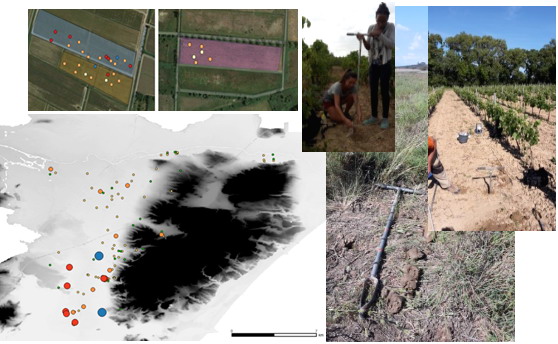 © Photos: Salinization states of water and soil in the low plains of the Aude river (F. Colin, 2019)
© Photos: Salinization states of water and soil in the low plains of the Aude river (F. Colin, 2019)
The study of waters and soils salinization in the coastal areas is particularly revealing of these general balances. Indeed, the current state of salinization results from natural processes (intrusion of marine water, presence of brackish groundwater, capillary rise, infiltration, percolation, leaching) and anthropogenic control actions (submersion, drainage). The historical challenge for many coastal areas was to establish water, soil and ecosystem management methods capable of maintaining the expected uses. Crisis situations induced by salinization (vegetation mortality, increased salinity of water bodies) are often indicative of imbalances caused by climate change (reduced rainfall, increased evapotranspiration, rising sea levels) and/or access to water resources (sharing between water withdrawals, access to resources outside the catchment area) and/or spatial patterns (agricultural reparcelling, impermeabilization, construction or removal of structures).
Therefore, the challenge is to adapt these territories. Salinization is considered here as a good prism to study both the changes to which the area is subjected and the adaptations in progress or in the future. This doctoral thesis topic offers two levels of questioning:
- (1) what is the state of soil and water salinity and how has it changed?
- (2) how is this phenomenon perceived/perceptible and managed?
This project will be carried out on the site of the low plains of the Aude River, which provides a diversity of processes potentially responsible for the salinisation of soil and water, a high-stakes area and an important link with the various stakeholders in the area with regard to the problem. It will benefit from the financial and partnership support of a study (2019-2021) carried out in collaboration between BRGM, Montpellier SupAgro, Le Grand Narbonne agglomeration and the Regional Natural Park La Narbonnaise.
Key words: soil-water-groundwater interactions, viticulture, salt-control practice, crowd sourcing data, biological indicators






